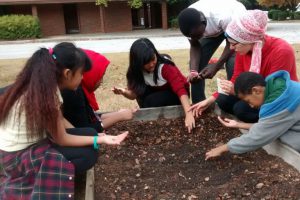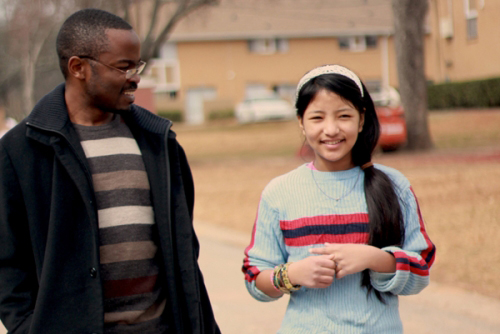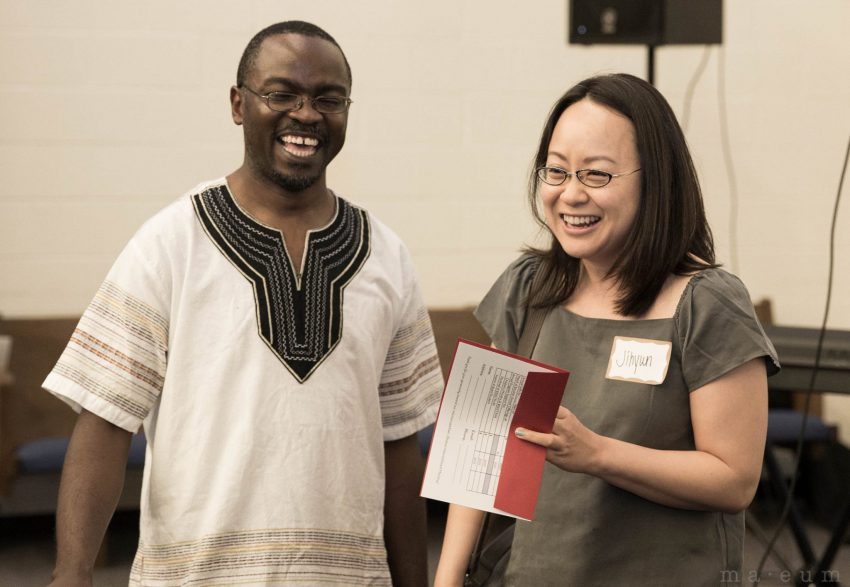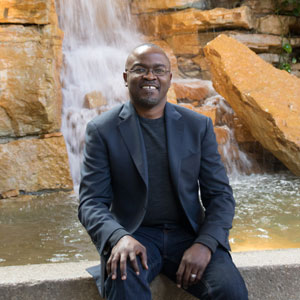Here at Pittsburgh Seminary, we seek to participate in God’s ongoing mission in the world by seeing and getting to know people as our neighbors. Challenged by Jesus’ parable of the Good Samaritan and inspired by Fred Rogers, who sang, “I have always wanted to have a neighbor just like you,” I am writing to introduce you to some of my neighbors, whom I want you to know. Today, I’d like to introduce you to my neighbor Gad Mpoyo.
Originally from the Democratic Republic of the Congo, Gad attended university in Zimbabwe then came to the United States to go to seminary at the Candler School of Theology. After seminary, he started Shalom International Ministries to support refugees and immigrants from Central and East Africa. In addition to serving as Pastor for Shalom, he works for the 1001 New Worshiping Communities movement within the Presbyterian Church (U.S.A.). As part of the Missional Leadership cohort in the DMin program at PTS, Gad is exploring how people in communities are connected and finding that as we seek the well-being of our neighbors, we find our own well-being.
– The Rev. Dr. Donna Giver-Johnston, Director of the Doctor of Ministry Program and Faculty member at Pittsburgh Theological Seminary
Who Is My Neighbor in a Multicultural Context Like Shalom International Ministry?
The question, “Who is my neighbor?” takes on different significance when viewed through the lens of diverse cultural experiences. As I reflect on my own journey from the Democratic Republic of the Congo to the United States, the concept of neighbors has evolved, revealing profound insights into what it means to be neighbors and the transformative impact it has on our lives.
Growing up in the Democratic Republic of the Congo, my neighbors were not just individuals residing in proximity; they were an integral part of my life’s journey. Together, we broke bread and marked significant milestones, from joyous graduations and weddings to the warmth of birthday celebrations. These were the people who not only participated in our family’s moments of happiness but also stood by us in times of sorrow, mourning with us when tragedy struck. Despite different tribal backgrounds and diverse geographical origins within the country, we formed a close-knit neighborhood that had compassion for one another and supported each other.
However, my understanding of who my neighbors are was shifted when I relocated to the United States eighteen years ago. In my new environment, I had minimal interaction with the families residing next to my apartment, and our knowledge of each other’s lives was limited. The once vibrant tapestry of communal living seemed to fade into the background.
 However, my perspective shifted when I visited the town of Clarkston, Ga., where Shalom International Ministry is located. Clarkston, the small city with a big heart which welcomes refugees and immigrants from around the world, stands out as one of the most diverse cities in the country, with Clarkston High School alone having over 75 spoken languages. Though people come from different parts of the world as refugees or immigrants, speak different languages, and believe in different religions, they see themselves as people who are called to seek the well-being of the neighborhood and neighbors who live in it and beyond. Here, the question of “who is my neighbor?” transcends the physical proximity of living arrangements; it becomes a celebration of diversity and interconnectedness.
However, my perspective shifted when I visited the town of Clarkston, Ga., where Shalom International Ministry is located. Clarkston, the small city with a big heart which welcomes refugees and immigrants from around the world, stands out as one of the most diverse cities in the country, with Clarkston High School alone having over 75 spoken languages. Though people come from different parts of the world as refugees or immigrants, speak different languages, and believe in different religions, they see themselves as people who are called to seek the well-being of the neighborhood and neighbors who live in it and beyond. Here, the question of “who is my neighbor?” transcends the physical proximity of living arrangements; it becomes a celebration of diversity and interconnectedness.
This understanding of “who is my neighbor” here at Shalom and in Clarkston, in general, reminds us about the interaction that Jesus had with one of the lawyers, who asked him, “Who is my neighbor?” To answer his question, Jesus tells the story of the Samaritan who helped the person beaten by robbers (Luke 10:25-37). In this story, Jesus is giving an expansive understanding of who is a neighbor. Unlike the lawyer who limited his understanding of neighbor only to those in his circle, Jesus reminds him, as he is reminding us today, that our neighbor also includes the Samaritan – the despised, hated, ostracized.
With such a new insight into this expansive understanding of my neighbor, here at Shalom International Ministry, we seek to embody Jesus’s teaching by seeing our neighbor beyond race, country of origin, sexual orientation, tribe, and economic class. What matters is supporting and having compassion for one another, regardless of where members of Shalom come from and live. For example, a month ago, on a Sunday morning, right before we started the service, three people showed up at church. They came to the United States as refugees – one from Uganda and two others from Cameroon. From the minute that they introduced themselves, it did not take long to embrace them as part of our Shalom community. Acts of kindness, such as visiting with them, taking them to grocery stores, assisting them with translation, and praying with them, bridged cultural, religious, and language gaps, fostering an environment where diverse backgrounds were not seen as barriers or threats but rather as threads that enriched the fabric of who we are as a church present in the neighborhood. Since coming to Shalom International Ministry, these people are not only active but part and parcel of the church life, which continues to cultivate a sense of belonging.
 “Who is my neighbor” is not just a geographical question; it is a reflection on interconnectedness that defines our human experience – from the Samaritan who helped the man who fell into the hands of robbers to my upbringing in the Democratic Republic of the Congo to leading Shalom International Ministry. “Who is my neighbor” is a question that is relevant even today as we struggle to care for one another and achieve peace, justice, and love for our neighbors across our communities. Perhaps reflecting on this question will open a window to see the “other” as ourselves. Perhaps asking this question, “who is my neighbor,” will open a window to see that our lives are inextricably interconnected. Perhaps this question will open our eyes to have deep compassion for one another and value the lives of people who don’t look like us or speak like us and be reminded that we are all created in God’s image.
“Who is my neighbor” is not just a geographical question; it is a reflection on interconnectedness that defines our human experience – from the Samaritan who helped the man who fell into the hands of robbers to my upbringing in the Democratic Republic of the Congo to leading Shalom International Ministry. “Who is my neighbor” is a question that is relevant even today as we struggle to care for one another and achieve peace, justice, and love for our neighbors across our communities. Perhaps reflecting on this question will open a window to see the “other” as ourselves. Perhaps asking this question, “who is my neighbor,” will open a window to see that our lives are inextricably interconnected. Perhaps this question will open our eyes to have deep compassion for one another and value the lives of people who don’t look like us or speak like us and be reminded that we are all created in God’s image.
The Rev. Gad Mpoyo is a Doctor of Ministry student in the Missional Leadership cohort at Pittsburgh Theological Seminary and is a graduate of Candler Theological Seminary and of Africa University in Zimbabwe. He is the Organizing Pastor of Shalom International Ministry and Associate for the Southeast Region of the 1001 New Worshiping Communities movement in the Presbyterian Church (U.S.A.).



1 thought on “Who Is My Neighbor? The Rev. Gad Mpoyo on Neighbor, “Other,” and Interconnectedness”